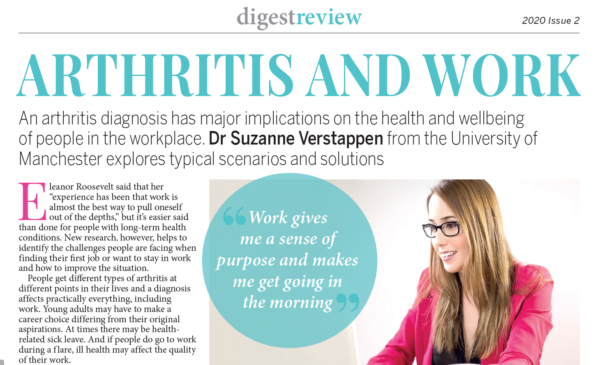Arthritis and work – Dr Suzanne Verstappen speaks to Arthritis Digest
Arthritis Digest is a magazine for people with arthritis that highlights the latest relevant research and reviews topical issues. Researchers within our adult and childhood arthritis programmes are contributing articles for every issue in 2020, with Dr Suzanne Verstappen from our Adult Inflammatory Arthritis Programme, the latest NIHR Manchester BRC contributor.
NIHR Manchester BRC’s overall aim is to ensure that each patient gets the treatment that is right for them as an individual, an approach which forms our precision medicine strategy. As an arthritis diagnosis has major implications on the health and wellbeing of people in the workplace, Dr Verstappen’s piece explores typical challenges and offers advice for those with the condition, noting that suitability of potential solutions will vary according to individual needs and experience.
Eleanor Roosevelt said that her, ‘experience has been that work is almost the best way to pull oneself out of the depths’, but it’s easier said than done for people with long-term health conditions. New research, however, helps to identify the challenges people are facing when finding their first job, or want to stay in work, and how to improve the situation.
People get different types of arthritis at different points in their lives and a diagnosis affects practically everything, including work. Young adults may have to make a career choice differing from their original aspirations. At times, there may be health-related sick leave and if people do go to work during a flare, ill health may affect the quality of their work.
We need to help people with arthritis find the right jobs and remain in paid work and to do so, we must get a better understanding of which factors are most important for individuals to stay in work.
Challenge
Young people diagnosed with arthritis have not been taken into account by policy makers because they fall between the Department of Education and the Department of Employment. We didn’t know what impact arthritis and career advice was having until very recently.

Advice
People diagnosed with arthritis before the age of 16-years-old can make suitable future career choices with good support and advice during the period. Careful planning is key – ensure that career aspirations are realised, but take into account the importance of good health.
Challenge
Despite better treatments for people with inflammatory arthritis, most of those who struggle at work will stop working within the first five years of disease-onset. Once people stop, it becomes difficult to start working again.
Advice
Early discussions with the employer, colleagues, human resources (if available) and health professionals about problems at work may prevent people having problems at work or even having to stop work because of their health during the first couple of years of their diagnosis. If nervous, consider what you may need to discuss, including:
- the condition you have
- symptoms and how they may vary on a daily basis
- effects of medication
- tasks you may need help with
- what useful support might consist of.
Challenge
People with inflammatory arthritis are not always well understood by colleagues because the condition tends to be invisible. Colleagues may not fully understand why some people feel well one day and able to do their job, but struggle the next day because of a flare.
Advice
Health conditions are personal and it’s up to you whether you feel able to be open with colleagues. Provide literature to enable co-workers to learn about the issues you are facing. Think about joining a local arthritis support group to meet others in similar situations.
Challenge
Some tasks at work may be more difficult or may increase arthritis symptoms, ultimately leading people leaving employment.
Advice
Small changes in the working environment – such as flexible working hours, adjustment to the computer screen or parking near the entrance of work – can make a huge difference and do not need to cost too much. A grant from Access to Work can pay for practical support to help people start work, stay in work or move into self-employment.
Challenge
Sometimes arthritis is so severe that people do give up work. What financial help is out there and how can it be accessed?
Advice
Support is out there in a number of forms. For example, Employment and Support Allowance is for people who have a health condition or disability that limits their ability to work, and can be accessed via the Jobcentre Plus claim line or the Universal Credit Service Centre. Personal Independence Payment is another option – it helps cover the extra costs people with arthritis face to take part in everyday life. The charity, Versus Arthritis, offers expert advice in this area.
The bottom line
Loss of a job affects the financial situation of people with arthritis, their sense of social participation and self-worth and results in high financial costs for society.
Our research will continue to identify fresh challenges and solutions, and ultimately lead to a better quality of life for people with arthritis, at an overall benefit to society on many levels.
